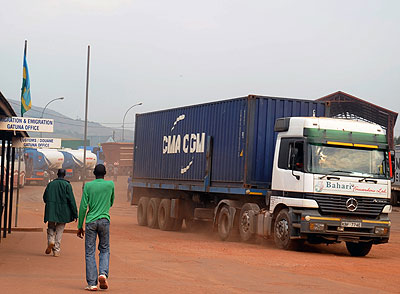There is more need for development of more modern infrastructure and bigger ports if the region is to cope with the increasing cargo volumes, Dr. Richard Sezibera, the secretary general of the East African Community (EAC), has said.


There is more need for development of more modern infrastructure and bigger ports if the region is to cope with the increasing cargo volumes, Dr. Richard Sezibera, the secretary general of the East African Community (EAC), has said.
According to Sezibera, East Africa’s cargo volume is estimated to triple in the next 15 years.
"In 2018, we will begin transporting oil and oil products out of East Africa. But the current road network cannot handle the task. This is why we are putting a lot of emphasis on developing a modern railway network,” Sezibera said recently in Kampala.
He further noted that because of limited capacity of Mombasa and Dar es Salaam ports, many traders have resorted to transshipping with heavy vessels that can dock at Djibouti port.
"Mombasa, even with the recent expansion, cannot handle all of East Africa’s cargo. We need another port at Tanga. We also need a deep water port,” Sezibera said.
Commenting on the need for better infrastructure in the EAC bloc, Mark Priestley, the TradeMark East Africa country director, said countries that are not directly linked to the sea port need stronger and efficient roads and railway lines, not only to cope with the increasing trade volumes, but also to ease the cost of doing trade.
According to Ministry of Infrastructure, the mapping of the Kigali-Kampala railway that will connect Rwanda to the sea port is expected to commence next month and will cost about Rwf4b.
Theodore Murenzi, the chairman of the Rwanda Long Distance Truck Drivers Union, said the number both in bound and out bound cargo trucks has increased with the launch of the single customs territory.
"This ultimately calls for more sustainable infrastructure in theregion,” Murenzi noted.
Nathan Gashayija, the director of policy and programmes co-ordination in the Ministry of East African Community Affairs, said there is need for more support services, like warehouses and parking facilities, at the ports and border posts to handle the large number of cargo trucks.
Jackie Rurangwa, the managing director of Multilines International, a logistics company, said the business community greatly supports the railway project. "It will be cheaper for us to transport our commodities across the EAC,” Rurangwa said.
Rwanda is Kenya Ports Authority’s fourth-largest trading partner, with a total cargo turnover of about 260 million tonnes per year.


